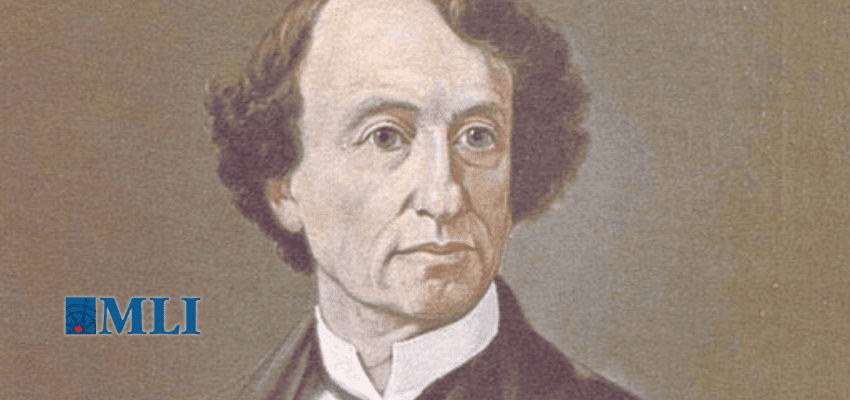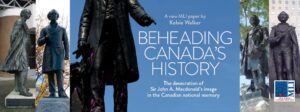By Kelsie Walker, May 31, 2024
Intellectual diversity and academic freedom are being challenged as free speech in academia is increasingly restricted. Universities should encourage open debate and the exchange of ideas. However, there is a growing trend towards censorship and the suppression of dissenting opinions, with certain perspectives being marginalized or silenced altogether.
This stifling of free expression not only betrays the very principles upon which higher education is built – it also hinders the development of critical thinking skills among students.
Unfortunately, I recently witnessed this troubling decline first-hand. From 2021–23 I worked to complete a Master of Arts with a specialization in history at the University of Calgary. My thesis examined one of Canada’s most controversial figures, Sir John A. Macdonald, and how the image of Canada’s first prime minister has changed in both historiography and in the public sphere over time.
I took a hard stance against cancel-culture, historical revisionism, and presentism, and advocated for a well-rounded presentation of Macdonald’s record. This should not have been viewed as a controversial argument in the slightest. However, because of my research, I experienced a hostile and toxic culture that sought to silence and discourage my opinions and reprimand me for thinking differently. My experience was so discouraging, that I have put my plans to pursue a doctorate on hold.
As soon as news of my research circulated in the history department, I was judged by many to be an intolerant, outdated conservative. I faced constant ideology-fuelled hostility in almost every facet of my MA degree – from fellow students, department members, and professors.
Everything I did, said, and wrote seemed to be tainted by their partisan perceptions of me. I received numerous emails from fellow students criticizing my opinions. I was accused of being intolerant simply for holding opposing views during lively seminar debates. I was blatantly ignored for more than two years by multiple professors; this included snubbing me as I greeted them in the hallways, and even sitting down as I crossed the stage at my convocation ceremony, despite rising to congratulate other students from my program. At nearly every turn, I felt hostility as a direct result of the department’s seeming desire for a uniform progressive ideology.
Perhaps the most alarming aspect of this hostility was that it was so overt; no efforts were made by my critics to hide their disdain for me or my views.
For instance, during a mandatory scholarship proposal workshop, my research project was harshly torn apart line by line, while the proposals of more progressive students – focused on topics such as gender or ethnic history – faced high praise and little critique. I was told that my research was not genuine history: that it was disrespectful and insensitive, and that I would never receive funding for it. It was one of the lowest moments of my academic career.
Ironically, I later received prestigious Canada Graduate Scholarship funding for the very same research – an achievement that came with little praise from my peers and practically no acknowledgment from department members.
During classroom debates, it often felt like I was specifically being called out for my views. My research was frequently cited by both professors and fellow students as an example of “poor” and “outdated” approaches, and my thoughts on nationalism, patriotism, and presentism were deemed as wrong because I did not subscribe to post-colonial, modernist theoretical approaches to history.
I began to fear that my “unacceptable views” were harming my grades. For instance, in a final paper I wrote for one course, examining Macdonald’s 1885 Electoral Franchise Act, I concluded that the act was blatantly racist, yet astoundingly generous for its time. The paper was poorly received, and I was critiqued for my “obvious admiration of Macdonald.” While I could have appealed the grade, the appeals process itself does not favour those who harbour views that differ from their professors.
Thankfully, I was able to defend my thesis before a committee made up of encouraging academics from across the political and ideological spectrum. It was the first and only time in two years that I did not fear academic persecution because of my research.
Academic institutions must encourage debate. No ideas should be sacrosanct. And yet, viewpoints are being stifled in the name of political correctness and ideological conformity. Consider the case of Lindsay Shepherd, who as a graduate student and teaching assistant at Wilfrid Laurier University in 2017 was wrongly accused of creating a “toxic environment for students” for simply playing clips of a media interview with psychologist and author Jordan Peterson. While Shepherd was ultimately vindicated, her example – and mine – are clear signs that diverse perspectives are no longer welcomed on Canadian campuses.
For much of my degree, I was met with intense pushback. My critics seemed to prefer the history department to be a “safe space” – safe from debate, safe from discomfort, safe from thoughts and ideas that challenged so-called “progressive” ideology. But higher education is supposed to be challenging. It is supposed to be uncomfortable. And it certainly should not reward students for conforming to only one line of thought.
The political debate over ideologically driven research funding is beginning to heat up. In Alberta, Premier Danielle Smith’s United Conservative Party government recently introduced Bill 18, The Provincial Priorities Act, which would grant the province approval power over agreements struck between “provincial entities,” such as universities, and the federal government. Explaining the rationale for the proposed law, Smith said the federal government “uses its power through researchers to only fund certain types of opinions, certain types of researchers, and I don’t think that’s fair.”
Critics say the Bill 18 goes too far – but what about the students who are currently being forced into an impossible choice – conform to the dominant ideologies, or give up their academic dreams?
Universities must pay more than lip service to the notion of academic freedom and free speech. They must also support students who dare to challenge the status quo. If not, they risk losing countless brilliant minds. And on campuses across the country, all that will remain are sanitized, politically correct, intolerant echo chambers that reward conformity and reprimand free thought.
Kelsie Walker is a project manager at the Macdonald-Laurier Institute.







